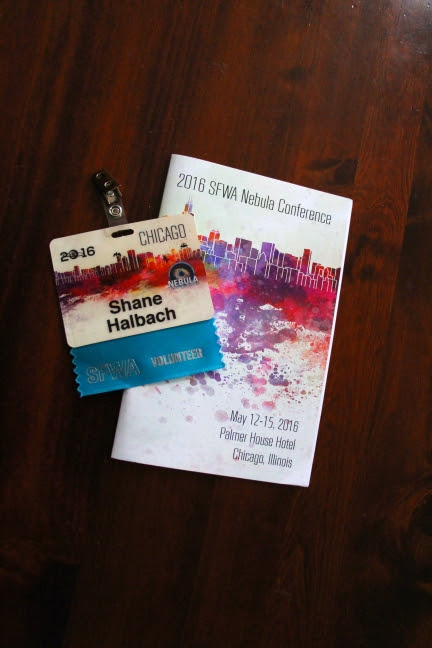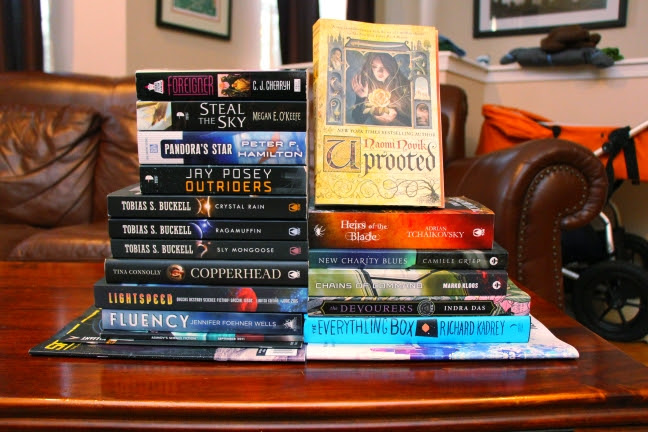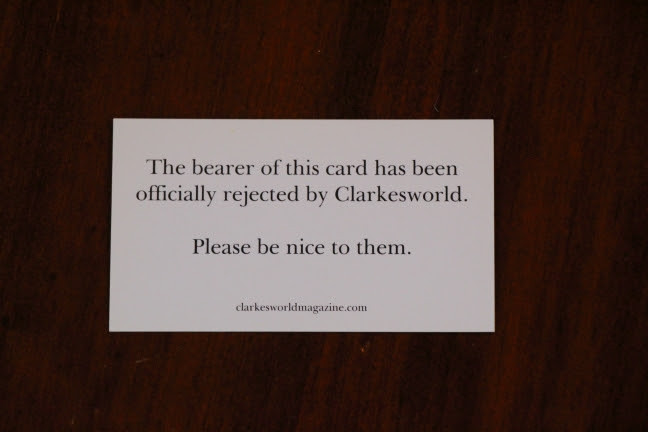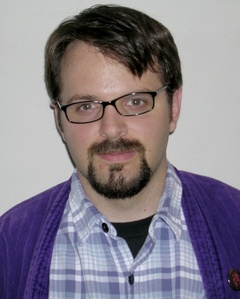In his future, I see a fish. It swims very near the white sand of the sea floor a few feet below the surface. Bright tropical sun pierces the clear turquoise water. Through his eyes I watch the fish for the entire six seconds, until time runs out and my consciousness is returned to the present.
I open my eyes and study him. He’s an attractive man with a kind face. He looks back at me expectantly from across the sitting table. Atop the checkered tablecloth sits a crystal ball, a bronze candelabrum with a trio of lit scented candles, and a few other useless props. I draw a deep breath, inhaling the smell of eucalyptus and mint, and try to decide which lie he would like to hear.
“Next week will be a fortuitous time to move forward on the business decision you’ve been putting off,” I tell him. “But you must tread carefully; the success of your venture hinges on your good judgment about the people involved.”
It’s an almost meaningless statement that invites the client to fill in the blanks, to apply the vague prediction to their own circumstances. The kind of person who would buy a cheap fortune-telling from a mall psychic requires little finesse.
I watch him carefully. Most people who walk through my door are here about business or love. He’s intent, even somewhat anxious, but there isn’t a strong reaction to my words. Not business, then.
My right hand rests on the crystal ball for effect, and I try again.
Divination is a crapshoot. The soothsayer can peer through somebody else’s eyes and see a six-second fragment of their future. Trouble is, the fragment is random, and it offers no context. People spend most of their lives doing inconsequential things: sleeping, eating, driving, watching TV. To happen upon a fragment that offers any kind of real insight into the future is exceedingly rare.
Those of us with a real gift are like the gold rush prospectors, sifting through sand for nuggets of gold. We go spelunking in people’s futures, hoping to strike it big with a stock tip or a game score. A fortune-teller in Tulsa happened upon the fragment of a man watching the Super Bowl. She had to wait a few years, but when the time came she cashed in. My client doesn’t seem like the sort who reads the stock pages, but you never know what you might find.
This time there’s a highway. Wipers are sweeping raindrops from the windshield and he strains to see the road ahead through the dark and the rain. I hope for some road signs, but the time runs out before he sees any.
Back in the present, I glance at his finger. There is no ring. “The love you seek will be requited. It awaits only for you to act.”
Bingo. His eyes widen with excitement. “I should ask her out, then?”
I dive in one more time.
In this fragment, he is looking at an old photograph. His hand holding it is unsteady and wrinkled with age. In the photo, there are the two of us: hugging, smiling, our faces alight with bliss.
As soon as the fragment ends my eyes snap open, and I look at him in a new way. He seems very pleasant; I can definitely see us together. Has he come here not because he wanted a reading, but because of me? I feel my cheeks blush. I’ve never heard of a seer finding themselves in somebody else’s future. Perhaps I’ve struck gold in a different way.
I smile at him. “Yes. You should ask her out, right away.”
A smile slowly spreads across his face. “You know, I think I will.”
Then he reaches into his pocket for a few bills, places them on the table next to the candelabrum, and walks out.
Stunned, I watch him go.
But what about the photo, I want to scream. Future fragments are often useless, but they’re never wrong.
In my line of work I’m forced to constantly lie. But it’s not the lies I’m selling. It’s the confidence my clients need: the extra push to do whatever it is they wanted to do all along, the perceived blessing from some kind of a supernatural power.
I think back to how happy we both looked in that photograph. My fraudulent fortune-telling has given this man the confidence to pursue someone he’s interested in. Can my real power not do as much for me?
I get up and push past the table, rattling the crystal ball, and rush out the door to see if I can catch him.
© 2016 by Alex Shvartsman
 Alex Shvartsman is a writer, translator and game designer from Brooklyn, NY. Over 80 of his short stories have appeared in InterGalactic Medicine Show, Nature, Galaxy’s Edge, Daily Science Fiction, and many other magazines and anthologies. He won the 2014 WSFA Small Press Award for Short Fiction and is the finalist in the 2015 Canopus Award for Excellence in Interstellar Writing. He is the editor of the Unidentified Funny Objects annual anthology series of humorous SF/F. His collection, Explaining Cthulhu to Grandma and Other Stories and his steampunk humor novellaH. G. Wells, Secret Agent were both published in 2015. His website is www.alexshvartsman.com
Alex Shvartsman is a writer, translator and game designer from Brooklyn, NY. Over 80 of his short stories have appeared in InterGalactic Medicine Show, Nature, Galaxy’s Edge, Daily Science Fiction, and many other magazines and anthologies. He won the 2014 WSFA Small Press Award for Short Fiction and is the finalist in the 2015 Canopus Award for Excellence in Interstellar Writing. He is the editor of the Unidentified Funny Objects annual anthology series of humorous SF/F. His collection, Explaining Cthulhu to Grandma and Other Stories and his steampunk humor novellaH. G. Wells, Secret Agent were both published in 2015. His website is www.alexshvartsman.com
If you enjoyed the story you might also want to visit our Support Page, or read the other story offerings.

 “Space Raptor Butt Invasion” is one of the
“Space Raptor Butt Invasion” is one of the 




 Shane lives in a secret lair deep under Chicago with his wife and three kids, where he writes software by day and practices his maniacal laughter by night. His fiction has appeared in Analog, Escape Pod, The Year’s Best YA Speculative Fiction, and elsewhere. He plots (diabolically) at
Shane lives in a secret lair deep under Chicago with his wife and three kids, where he writes software by day and practices his maniacal laughter by night. His fiction has appeared in Analog, Escape Pod, The Year’s Best YA Speculative Fiction, and elsewhere. He plots (diabolically) at  Joshua Gage is an ornery curmudgeon from Cleveland. His first full-length collection, breaths, is available from VanZeno Press. Intrinsic Night, a collaborative project he wrote with J. E. Stanley, was published by Sam’s Dot Publishing. His most recent collection, Inhuman: Haiku from the Zombie Apocalypse, is available on Poet’s Haven Press. He is a graduate of the Low Residency MFA Program in Creative Writing at Naropa University. He has a penchant for Pendleton shirts, rye whiskey and any poem strong enough to yank the breath out of his lungs.
Joshua Gage is an ornery curmudgeon from Cleveland. His first full-length collection, breaths, is available from VanZeno Press. Intrinsic Night, a collaborative project he wrote with J. E. Stanley, was published by Sam’s Dot Publishing. His most recent collection, Inhuman: Haiku from the Zombie Apocalypse, is available on Poet’s Haven Press. He is a graduate of the Low Residency MFA Program in Creative Writing at Naropa University. He has a penchant for Pendleton shirts, rye whiskey and any poem strong enough to yank the breath out of his lungs.